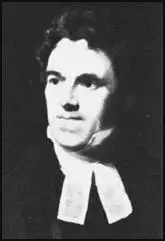Thomas Arnold

Thomas Arnold, the son of William Arnold, a customs officer, was born at East Cowes, Isle of Wight on 13th June 1795. Arnold was educated at Winchester and Corpus Christi College, Oxford, where he met his lifelong friend, John Taylor Coleridge. A brilliant student, Arnold obtained a first-class degree and was granted a fellowship at Oriel.
In 1818 Arnold was ordained deacon and settled at Laleham, a village on the Thames. While a deacon, Arnold formed a small school where he prepared pupils for university. After nine years at Laleham, Arnold was invited to became a master at Rugby School.
Although a prosperous private school, Rugby was not seen as having the same status as schools such as Eton or Winchester. After Arnold had been appointed headmaster in 1828, he successfully regenerated the school. The education developed at Rugby was graphically described in Tom Brown's Schooldays, a novel written by a former pupil, Thomas Hughes.
Thomas Arnold had a profound and lasting effect on the development of public school education in England. Arnold introduced mathematics, modern history and modern languages and instituted the form system and introduced the prefect system to keep discipline. He modernized the teaching of Classics by directing attention to literary, moral or historical questions. Although Arnold held strong views, he made it clear to his students they were not expected to accept those views, but to examine the evidence and to think for themselves.
Arnold had a deep sympathy for the poor and in 1831 he started a newspaper that advocated social reform. The newspaper failed but Arnold continued to write on these subject for the rest of his life. Arnold was also a strong supporter of Catholic Emancipation.
Arnold wrote several book including Principles of Church Reform (1833), History of Rome (1838) and Christian Life (1841). Thomas Arnold died in 1842.
